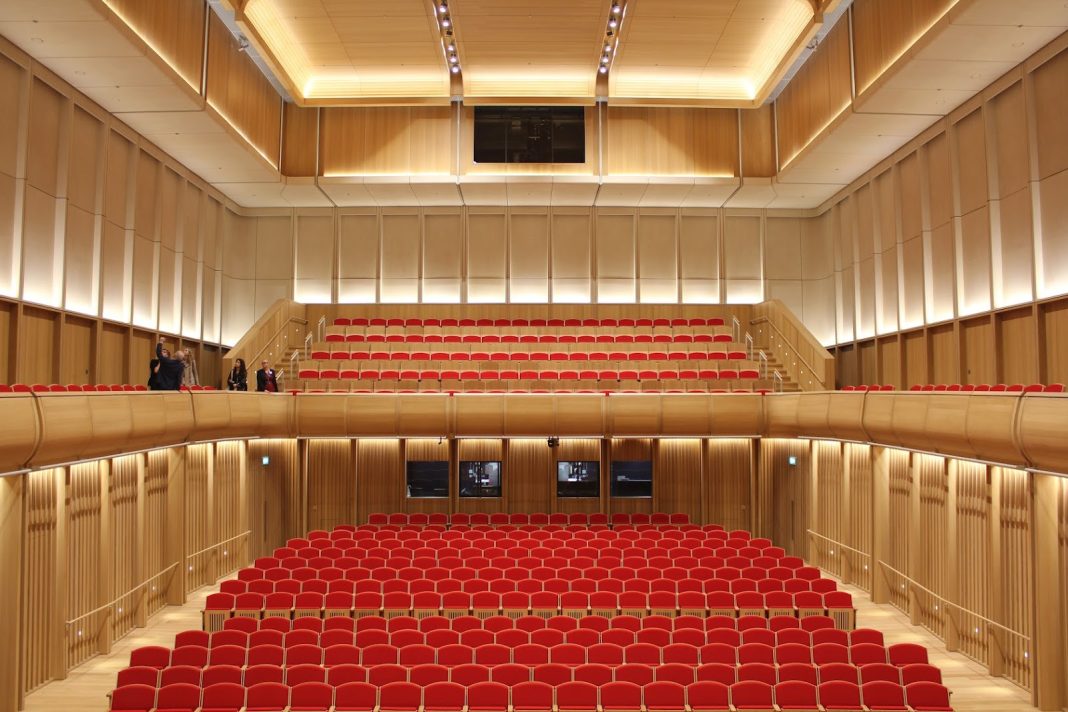The new Schwarzman Centre for the Humanities, located in Oxford’s Radcliffe Observatory Quarter, opened on 30th September.
Alongside teaching provisions, such as seminar rooms and the new Bodleian Humanities Library, the centre has various state-of-the-art performance and rehearsal spaces: a concert hall, a lecture hall which doubles as a drama theatre, a black box experimental performance space, a music studio, a recital hall and dance studio, and practice rooms that are available to be booked by music students. The performance spaces will be accessible for Oxford University Music Society (OUMS) ensembles and Oxford University Drama Society (OUDS) groups through a centralised booking system, which currently states that bookings are only available from January 2026. Additionally, the centre will be the new home of the Bate Collection of Musical Instruments and Archives. The faculty’s heirloom gamelan has already been moved into the recital hall.
These spaces open up a huge range of exciting possibilities for performances by both students and professionals. Placing the humanities together in one building creates new pathways for collaboration between disciplines. The architects have paid detailed attention to the acoustic capabilities of the building: the concert hall was designed by Arup Acoustics to be completely soundproof, and the hall is connected to the black box theatre so that sound can be fed in, allowing for interdisciplinary performance.
The Oxford Cultural Programme will be putting on a range of events, such as concerts, spoken word, dance, theatre, and art installations. Some of these will be in collaboration with the ten new Cultural Fellows that the centre has appointed. Concerts to look out for include the BBC Singers with composer Eric Whitacre, a concert with the London Gay Big Band, a performance by composer Anna Clyne, a music and spoken word performance with Kim Stanley Robinson and Brian Eno, and one by the Aurora Orchestra, known for playing complex classical repertoire from memory. The Sohmen Concert Hall isn’t quite big enough for a modern full-scale symphony orchestra, so the Aurora won’t be able to play its famous rendition of Stravinsky’s Rite of Spring, but will instead be treating audiences to a memorised performance of Mozart’s Symphony No. 41, ‘Jupiter’, and later of Bach’s Magnificat, amongst other works.
There will also be collaborations between student ensembles and professional musicians, such as Oxford Sings: Carmina Burana (with Conductor Benjamin Nichols, Oxford Bach Choir, and Merton College Choir), as well as Splendour and Majesty (with the University’s Schola Cantorum and His Majesty’s Sagbutts and Cornetts). It is promising that the Oxford Cultural Programme is enthusiastic about giving students a chance to perform with visiting musicians, and to participate in masterclasses and workshops.
The centre will open fully for teaching on 13th October, the start of Michaelmas term. Unfortunately for students like me who are entering their final year at Oxford, the Cultural Programme and access to the new performance spaces will only begin in April 2026, and the music studios are expected to open in week 4 of this term.

Nonetheless, it’s clear that the Schwarzman and the Oxford Cultural Programme are looking to situate Oxford as a cultural centre on a global scale. With its bar, cloakroom, and modern architecture, the basement housing the concert hall and other performance spaces are reminiscent of London venues like the Southbank Centre and the Barbican. The upcoming events by the Oxford Cultural Programme further emphasise the centre’s desire to be at the cutting edge of new developments in the fields of the arts, humanities and performing arts.
This is exciting for students who will have chances to witness and get involved with an expanding professional musical landscape. It’s also essential that the Schwarzman Centre continues to provide spaces for the rich student music scene that already exists at Oxford. As long as the centre adheres to its stated aims – providing for current students and setting graduates up to “thrive in often complicated and rapidly transforming workplaces” – it should be an important new resource for student musicians in Oxford.


